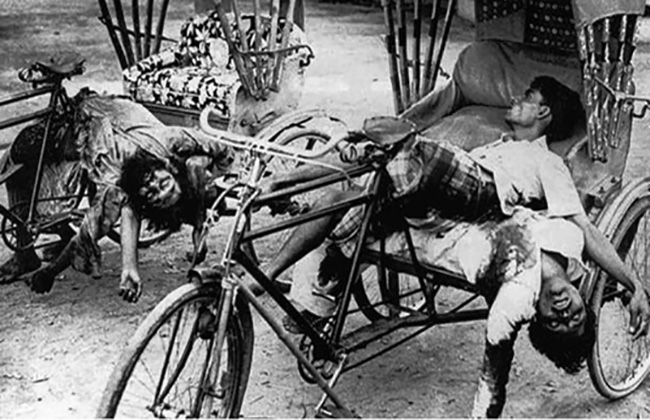
In the year of 1971, desire for liberation was intensifying in the minds of freedom-seeking Bengalis. Meanwhile, Pakistanis were extremely reluctant to accept the rights of the Bengalis. Bangabandhu Sheikh Mujibur Rahman’s meeting with Yahya Khan had been going on since March 16. He is steadfast in realizing the demands of seven crore Bengalis. The whole of Bengal (East Pakistan) was blowing in the dormant fire. The liberation-seeking Bengalis are just waiting for the final call from Bangabandhu. After the 150-minute meeting, Bangabandhu briefed reporters that the political situation in the country together with other issues were discussed. There will be more discussions. However, no decision was obtained from Yahya. Yahya Khan did not give any solution even after the sixth meeting. Meanwhile, he also canceled the meeting that was supposed to be held in the seventh phase, on 24thMarch. Until the mornings of 23 and 24 March respectively, the PakistanArmy carried out massacres in Syedpur and Rangpur cantonments. Hundreds got killed and thousands were injured. The agitating crowd started gathering in front of Bangabandhu’s house from this morning. “I don’t know if I will survive the hard struggle, you will continue your movement,” he said. “I will live as an independent human being, or I will be wiped out in the struggle,” he said. Bangabandhu Sheikh Mujibur Rahman further said, “No more talks, I want an announcement this time.” If there is no solution to the problem by tomorrow, Bengalis will choose their own path. We, seven and a half crore people, are united today. No conspiracy can hold us back.
Inside, Yahyawas preparing his forces. By the night of March 25, they had made a final plan. But the bucolic ethnic Bengalis did not even smell any rat. They are agitating for liberation. No one even imagined something brutal would come. On March 25, the atmosphere in Dhaka was quite tensed. Employees of the Pakistan Television in Dhaka station have gone on a wildcat strike in protest of the interference by the Pakistani military into television programmes. Clashes between army and mob, curfew in Rangpur followed. Meanwhile, the news that the Mujib-Yahya talks have failed spread like wildfire. He called on the people to be vigilant against any attempt to create communal riots. Bangabandhu came out of the house several times and stood on the balcony and addressed the crowd.
The Awami League was scheduled to submit its final report on the draft constitution to the President and set a date for its approval. Yahya’s associate general SGMM Peerzada promised to call a meeting. Awami League leaders have been waiting for a telephone call all day, but that didn’t happen. This morning, President General Yahya Khan and Pakistan People’s Party chief Zulfikar Ali Bhutto had a private meeting at the Presidential Palace. “The situation is critical,” Bhutto told reporters after the meeting. Shortly after his meeting with Bhutto, General Yahya held secret meetings with senior Army officials, including Lieutenant General Tikka Khan, Chief of General Staff General Abdul Hamid Khan, Major General Mittha Khan and Major General Rao Farman Ali. Major General Janjua, Major General Mittha Khan, Major General Nazar Hossain Shah and Major General Omar. He along with a few other senior army officers visited Rangpur, Rajshahi, Jessore, Comilla and Chittagong cantonments in a helicopter. In the afternoon onwards, the Pakistani army started helicopter surveillance, sending messages to members of military to get ready for an inevitable military operation. President General Yahya Khan secretly flew straight from the Presidential Palace to the airport in the evening without any announcement. As soon as he landed safely in West Pakistan, his forces became active in East Pakistan. Meanwhile, the news of Yahya’s departure from Dhaka reached Bangabandhu almost immediately. Addressing the party leaders, workers, supporters, student leaders and journalists present at Dhanmondi No. 32 around 9 pm, he said, “We tried our best to resolve the issue peacefully. But President Yahya Khan is more interested in solving the problem through military means. ”In this situation, we have to see our way. Everyone must be ready…”
News spread like wildfire that Yahya had left Dhaka and fled to Pakistan. Bengali people knew something terrible is coming. At night the students came down the road and built innumerable barricades. At the behest of Bangabandhu, the top leaders of the Awami League went into hiding. The preparations of the Pak army may have started as soon as the sun did set. At around 10 pm, a large convoy of the army left Dhaka cantonment for the city. At 11:30 pm, a cowardly Pakistani army came out of the cantonment. Sophisticated rifles, machine guns and mortars roared in the air. The night air turned heavy with the screams and cries of innocent people. The Pakistani executioners fired on the unarmed and sleeping Bengalis through indiscriminate firing. The barbaric massacre and the frenzy of destruction began. The shocked Bengali fell into the lap of death before they realized anything. Dhaka became a city of corpsessince midnight.
They started killing Bengalis indiscriminately at various places including Rajarbagh Police Line, Peelkhana EPR Headquarters, Dhaka University, Dhaka Medical College Hospital, Bangladesh University of Engineeringand Nilkhet vicinities.
The massacre was named ‘Operation Searchlight’. According to the blueprint of Operation Searchlight, the most barbaric and worst genocide in history began with the attack on unarmed Bengalis all over the country. They had an abominable aim of silencing the voices of the Bengalis.
The genocide of March 25, 1971 was not just a nightmare, it was basically the beginning of a brutal and heinous genocide in the history of world civilization.
